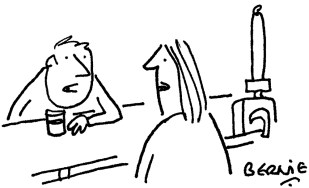
A very warm welcome for Margaret Thatcher inside autism’s ever-growing tent – if she can find space to wield her handbag. I could even lead the welcoming party myself as I am in there – according to some of my friends – on account of my unusually good ability to recall dates and a liking for solitude.
As for Thatcher, she has gained entry on the strength of her biographer Tina Gaudoin’s diagnosis, which is based around the former PM’s absence of a sense of humour (or at least an inability to share the jokes of her male, public school-educated colleagues), a lack of embarrassment, her ‘special or restricted interests’ and a tendency to see the world in black and white.
Is there going to be anyone left outside the autism tent in future? Can anyone say, for example, that they don’t feel a bit awkward in some social situations, or that they don’t have a passing interest in some kind of object – be it wading birds or diesel locomotives – which other people find a bit dull?
If you are sure you are not autistic then I recommend you take an online test, such as the one which has just given me a score of 17 out of 30, putting me in the ‘borderline indication’ band. ‘Sometimes people say I am being rude, even though I think I am being polite’; ‘I notice small changes in people’s appearances’. Answering ‘yes’ to either of those will shove you a little way down towards the autism spectrum.
A lot of them are just Barnum statements – things we think are true of ourselves but not so true of others. ‘I frequently get so strongly absorbed in one thing that I lose sight of other things’; ‘I prefer to do things the same way over and over again.’ And the favourite question I have seen in these tests: ‘I prefer to read a book rather than go to a party.’ The possibility it might depend on the relative quality of the party and the book seems not to occur; if seeing things in black and white is an autistic trait then whoever designed the test is certainly on the spectrum.
Another of the questions goes: ‘I have trouble working out other people’s intentions.’ Well, I don’t have any problem working out the intention of the makers of the test, which ended with me being invited to undertake a full assessment at a cost of £2,250.
Autism has been jumped on by opportunistic quacks who can see it is a fashionable diagnosis. But there is more to it than that. There is a ‘neurodiverse’ movement which actively seeks to expand autism diagnoses for political reasons. The more people inside the tent, goes the thinking, the more society will understand the condition and the better life will be for autistic people.
People perfectly able to function in society are grabbing the resources and attention from people who cannot
Sorry, but I am going to disagree with that. What is going on is that people who are perfectly able to function in society are grabbing the resources and attention from people who clearly cannot.
The neurodiverse movement is based on a simple conceit: that autistic people are all essentially geniuses, but whether or not they are able to express those skills and achieve great things depends on how society treats them. They are trying to sell us a Hollywood idea of autism, where people triumph against adversity through determination and courage. It is fed by genuine examples of autistic people showing themselves to have remarkable abilities, such as the artist Stephen Wiltshire, who is able to make incredibly detailed drawings of buildings from memory. There used to be a term for this: ‘idiot savant’, now thankfully reduced to just ‘savant’.
It is a lovely idea that all autistic people are like this. We now have Albert Einstein, Leonardo da Vinci, Steven Spielberg, Vincent van Gogh, Alfred Hitchcock, Thomas Edison and Alexander Graham Bell all in our tent, according to some.
Sadly it is all rot. I know a lot of autistic – I mean genuinely autistic – people through my daughter (who has severe learning difficulties but was not, until a couple of years ago, regarded by any professional as autistic). While I would love to think that some great talent resided deep within them all, I’m afraid few are going to be gracing the honours boards of our great universities, however much effort is put into their care. The mundane reality is they are all disabled, to a greater or lesser extent, and that few of them will ever succeed in living independently – and even fewer are going to invent something or produce great works of art.
Does society really see such people any more, now that autism has been grabbed by the neurodiverse crowd? Claiming an autism diagnosis when you are perfectly able to function, with maybe just the odd eccentricity, might help you in some way in the age of victimhood.
One possible return is extra time in exams. Or there is cash under the racket that is personal independence payments. But you are not helping people who really need help; rather you are drawing help away from them. You are diluting the condition of autism to the point of meaninglessness.

The questions asked in these autism tests break down into two types: there are the questions which relate to personal preferences as to how you spend your time, and there are the questions which relate to an inability to read humans in some way. The reason that I – and possibly you, too – get a score high enough to put me in the supposedly autistic spectrum is because I’m not the Duchess of Alba and I can’t face a party every night, nor indeed more than about once a fortnight. But when it comes to the other questions, I score zero. No, I don’t have any trouble telling when I am boring other people, nor whether they are happy, sad, angry or pleased, nor when they are being ironic or scheming.
The questions which the online autism tests should really be asking are these: can you get yourself dressed, can you feed yourself, do a bit of housework, get out of the house by yourself and do a bit of shopping, hold down the most basic of jobs – and can you actually read this test at all? If you can’t answer ‘yes’ to those, then you really do deserve to be classified as having a disability.
Otherwise, please call yourself eccentric, antisocial, an oddball or something which doesn’t deflect attention away from the genuinely autistic.








Comments